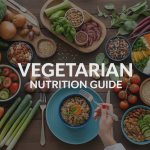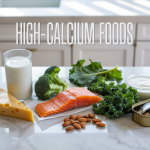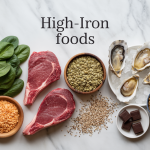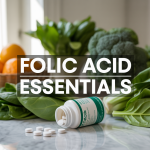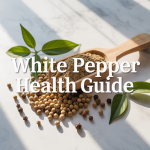Vitamin B12 is a crucial water-soluble vitamin that keeps your nervous system healthy, helps make red blood cells, and supports DNA production. This guide is perfect for anyone wanting to understand B12 better – whether you’re concerned about getting enough, following a plant-based diet, or just curious about this essential nutrient.
We’ll break down the daily amounts you actually need and where to find the best sources of vitamin B12 in your food. You’ll also learn how to spot the warning signs of B12 deficiency and discover which groups of people need to pay extra attention to their B12 levels.
Understanding Vitamin B12: Essential Facts and Functions
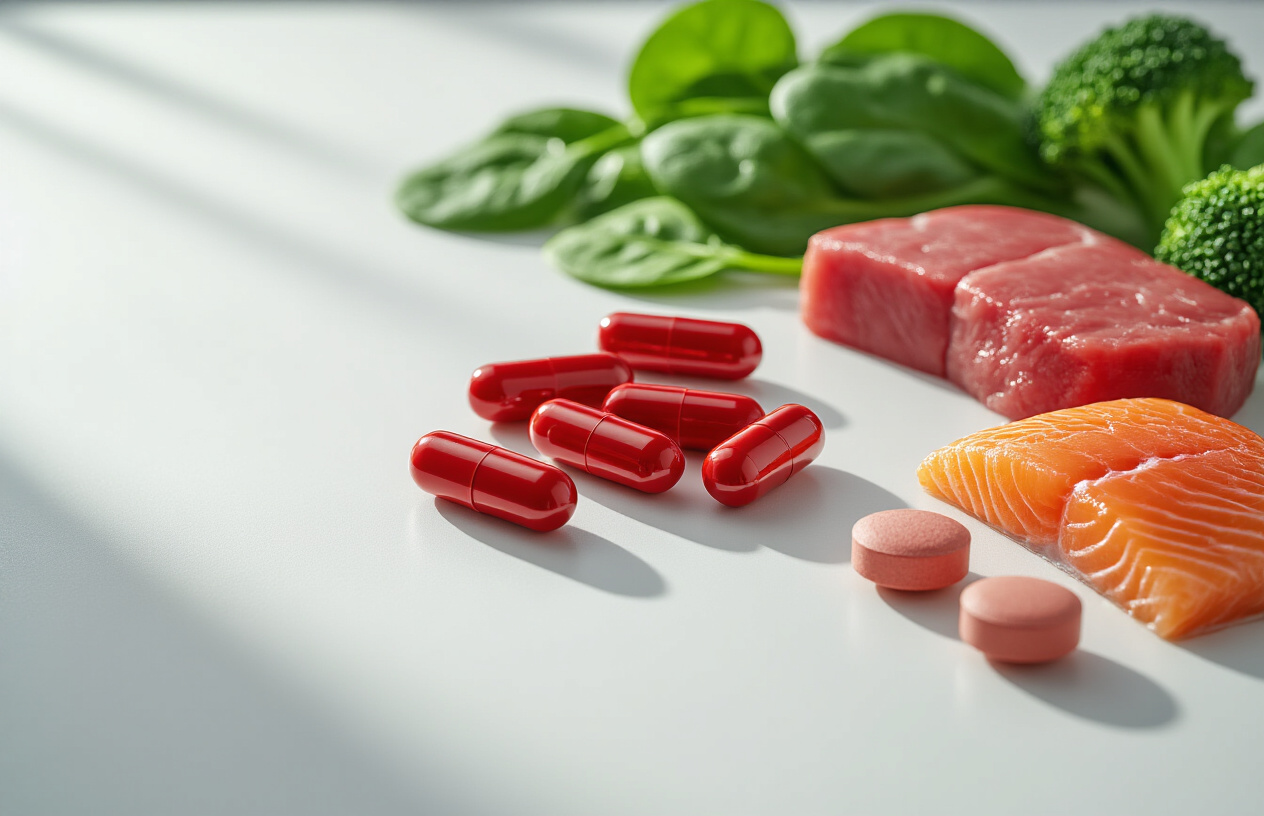
What Vitamin B12 Is and Why Your Body Needs It
Vitamin B12 is a unique water-soluble vitamin that contains the mineral cobalt, making it distinct from other B-vitamins. Its active compounds are collectively called cobalamins, with methylcobalamin and 5-deoxyadenosylcobalamin serving as the metabolically active forms in your body. Other forms like hydroxycobalamin and cyanocobalamin must undergo conversion to become biologically active.
This essential vitamin can be found naturally in some foods, added to fortified products, and is available as both dietary supplements and prescription medications. Your body requires vitamin B12 for three critical functions that are fundamental to your health and survival.
First, vitamin B12 plays a vital role in the development, myelination, and proper function of your central nervous system. Without adequate B12, your nervous system cannot maintain its protective myelin sheaths, leading to neurological complications.
Second, this vitamin is essential for healthy red blood cell formation. It ensures that your red blood cells develop properly and maintain their ability to carry oxygen throughout your body effectively.
Third, vitamin B12 is crucial for DNA synthesis, the process by which your cells create new genetic material during cell division and repair.
At the molecular level, vitamin B12 functions as a cofactor for two important enzymes: methionine synthase, which converts homocysteine to methionine and is crucial for producing the universal methyl donor S-adenosylmethionine, and L-methylmalonyl-CoA mutase, which converts L-methylmalonyl-CoA to succinyl-CoA in propionate metabolism.
How Your Body Absorbs and Uses Vitamin B12
The absorption of vitamin B12 is a complex process that varies depending on whether you’re consuming it from food sources or supplements. Understanding this process helps explain why some people may develop deficiencies despite adequate dietary intake.
When you consume vitamin B12 from food sources, it arrives in a protein-bound form. Your body must first separate the vitamin from these proteins through a carefully orchestrated process. Initially, saliva, hydrochloric acid in your stomach, and gastric protease work together to release B12 from its protein bonds. Once freed, the vitamin immediately binds with a protein called haptocorrin.
As this B12-haptocorrin complex moves into your duodenum, digestive enzymes free the vitamin from haptocorrin, allowing it to combine with intrinsic factor. Intrinsic factor is a crucial protein produced by parietal cells in your stomach lining and is essential for B12 absorption.
The B12-intrinsic factor complex then travels to the distal ileum, the final section of your small intestine, where it undergoes absorption through a sophisticated process called receptor-mediated endocytosis. This mechanism ensures that your body can efficiently capture and utilize the vitamin.
Fortified foods and dietary supplements offer an advantage in this process because they contain vitamin B12 in its free form. This means the vitamin can bypass the initial protein separation step and directly bind with intrinsic factor, potentially improving absorption efficiency.
Methods for Testing Your Vitamin B12 Status
Several laboratory tests can assess your vitamin B12 status, each with different levels of sensitivity and specificity. Understanding these testing methods helps you and your healthcare provider make informed decisions about your B12 health.
The most commonly used test measures serum or plasma vitamin B12 levels. Values below 200 or 250 pg/mL are generally considered subnormal and may indicate deficiency. However, this test has limitations and may not detect early or marginal deficiencies.
The most sensitive marker for B12 status is serum methylmalonic acid (MMA). When your body lacks sufficient B12, MMA levels rise because the enzyme L-methylmalonyl-CoA mutase cannot function properly without adequate B12 cofactor. MMA levels greater than 0.271 micromol/L suggest deficiency. However, it’s important to note that MMA levels can also increase due to renal insufficiency and naturally rise in older adults, which may affect interpretation.
Total plasma homocysteine levels provide another testing option. As B12 status declines, homocysteine levels typically rise, with values greater than 15 micromol/L suggesting possible deficiency. However, this marker has poor specificity because homocysteine levels are influenced by other factors, including low folate status and kidney function.
For cases where serum vitamin B12 levels fall in the borderline range of 150 to 399 pg/mL, checking serum MMA levels can help confirm whether a true deficiency exists, providing a more definitive diagnosis when initial results are ambiguous.
Daily Vitamin B12 Requirements and Intake Recommendations

Recommended Daily Amounts for Different Age Groups
The recommended daily allowances (RDA) for vitamin B12 vary significantly based on age and physiological needs. For infants aged 0-6 months, the adequate intake is set at 0.4 micrograms daily, increasing to 0.5 micrograms for infants 7-12 months old. These early requirements are typically met through breast milk or fortified infant formulas.
Children aged 1-3 years require 0.9 micrograms daily, while those 4-8 years need 1.2 micrograms. As children enter their teenage years (9-13), the requirement increases to 1.8 micrograms daily. For adolescents aged 14-18 and adults 19 years and older, the RDA is established at 2.4 micrograms per day.
These recommendations assume normal absorption and utilization of vitamin B12. However, individual needs may vary based on genetic factors, health conditions, and dietary patterns that could affect absorption efficiency.
Special Needs During Pregnancy and Breastfeeding
Now that we have covered the standard requirements, it’s important to understand that pregnancy and breastfeeding create increased demands for vitamin B12. During pregnancy, the RDA increases to 2.6 micrograms daily to support fetal development, particularly nervous system formation and DNA synthesis.
Breastfeeding mothers require even higher amounts, with the RDA set at 2.8 micrograms daily. This increased requirement ensures adequate vitamin B12 transfer through breast milk to support the infant’s rapid growth and neurological development. Maternal vitamin B12 status directly impacts the vitamin content in breast milk, making adequate intake crucial for both mother and child.
Current Intake Levels in the General Population
With this in mind, examining actual intake patterns reveals varying levels of adequacy across different populations. Most individuals following omnivorous diets typically meet their daily vitamin B12 requirements through regular consumption of animal products. However, certain demographic groups show concerning patterns of inadequate intake, particularly those following plant-based diets without proper supplementation or fortified food consumption.
Elderly populations often experience challenges meeting their vitamin B12 needs due to decreased stomach acid production and reduced intrinsic factor, which are essential for proper absorption. This physiological change can lead to functional deficiency even when dietary intake appears adequate.
Best Sources of Vitamin B12 for Optimal Health

Animal-Based Foods Rich in Vitamin B12
Animal products serve as the most concentrated and bioavailable sources of vitamin B12, as this essential nutrient is primarily synthesized by bacteria in the digestive systems of animals. Organ meats, particularly liver, stand out as exceptional sources, with beef liver containing approximately 70 micrograms per 3.5-ounce serving – far exceeding daily requirements. Kidneys, heart, and other organ meats also provide substantial amounts of this vital nutrient.
Fish and seafood offer excellent vitamin B12 content, with clams leading the category at nearly 84 micrograms per 3-ounce serving. Sardines, salmon, tuna, and mackerel provide significant amounts while delivering additional omega-3 fatty acids. Red meat, including beef and lamb, contains moderate to high levels of B12, typically ranging from 2-6 micrograms per serving.
Poultry products, including chicken and turkey, contribute meaningful amounts of vitamin B12, though generally less than red meat or fish. Eggs provide approximately 0.6 micrograms per large egg, making them a valuable source for vegetarians who consume animal products. Dairy products, including milk, cheese, and yogurt, offer moderate vitamin B12 content, with Swiss cheese and cottage cheese being particularly good sources.
Fortified Foods and Plant-Based Alternatives
Now that we have covered natural animal sources, fortified foods become crucial for individuals following plant-based diets or those seeking additional B12 intake. Nutritional yeast, a popular vegan ingredient, is often fortified with vitamin B12, providing approximately 2-8 micrograms per tablespoon depending on the brand and fortification level.
Many breakfast cereals undergo fortification with vitamin B12, offering convenient options for daily intake. Plant-based milk alternatives, including soy milk, almond milk, and oat milk, frequently contain added B12, though amounts vary significantly between brands. Some meat substitutes and plant-based protein products also include vitamin B12 fortification to appeal to vegetarian and vegan consumers.
Fortified foods require careful label reading, as vitamin B12 content varies considerably between products and manufacturers. The bioavailability of synthetic vitamin B12 used in fortification generally matches that of naturally occurring forms, making these products viable alternatives for maintaining adequate levels.
Supplements and Prescription Forms Available
With this understanding of food sources in mind, supplements provide targeted vitamin B12 delivery for those unable to meet requirements through diet alone. Oral supplements come in various forms, including tablets, capsules, sublingual tablets, and liquid preparations. Cyanocobalamin represents the most common and stable synthetic form used in supplements, while methylcobalamin and hydroxocobalamin offer alternative forms that some individuals prefer.
Sublingual tablets and liquid forms may offer enhanced absorption by bypassing potential digestive issues that can affect B12 uptake. Dosages in supplements range from daily maintenance doses of 2.4-25 micrograms to therapeutic doses of 1000 micrograms or higher for addressing deficiency.
Prescription forms include intramuscular injections, typically administered monthly, which ensure complete absorption regardless of digestive function. Nasal sprays and high-dose oral prescriptions provide additional options for individuals with absorption difficulties or severe deficiency. Healthcare providers may recommend prescription forms for patients with pernicious anemia, gastrointestinal disorders, or other conditions affecting B12 absorption.
Recognizing and Understanding Vitamin B12 Deficiency

Common Causes of Vitamin B12 Deficiency
Vitamin B12 deficiency can arise from several interconnected factors that affect the body’s ability to absorb, process, or obtain this essential nutrient. Understanding these underlying causes is crucial for effective prevention and treatment strategies.
Dietary Inadequacy represents one of the primary causes, particularly among individuals following strict vegetarian or vegan diets. Since vitamin B12 occurs naturally almost exclusively in animal-derived foods, plant-based diets without proper supplementation create significant risk for deficiency over time.
Malabsorption disorders constitute another major category of causes. Conditions such as celiac disease, Crohn’s disease, and other inflammatory bowel disorders can damage the intestinal lining, preventing efficient B12 absorption. Additionally, atrophic gastritis, which reduces stomach acid production, impairs the initial steps of B12 processing.
Intrinsic factor deficiency creates a specific absorption problem. This protein, produced in the stomach, is essential for B12 absorption in the small intestine. Pernicious anemia, an autoimmune condition that destroys intrinsic factor-producing cells, represents the classic example of this mechanism.
Age-related factors become increasingly significant as stomach acid production naturally decreases with aging, making it harder to extract B12 from food proteins. Certain medications, including proton pump inhibitors and metformin, can also interfere with B12 absorption when used long-term.
Warning Signs and Symptoms to Watch For
Recognizing vitamin B12 deficiency requires vigilance, as symptoms often develop gradually and can mimic other conditions. The manifestations span multiple body systems, reflecting B12’s widespread physiological importance.
Neurological symptoms frequently appear early and can include tingling or numbness in hands and feet, difficulty walking, balance problems, and memory issues. These symptoms occur because B12 deficiency affects myelin sheath formation, disrupting nerve signal transmission.
Hematological signs involve changes in blood composition. Megaloblastic anemia develops as red blood cells become abnormally large and immature, leading to fatigue, weakness, pale skin, and shortness of breath. The characteristic enlarged red blood cells can be detected through routine blood tests.
Cognitive and psychiatric symptoms may include depression, confusion, irritability, and in severe cases, dementia-like symptoms. These neuropsychiatric manifestations can be particularly concerning in older adults, where they might be mistakenly attributed to normal aging.
Physical symptoms encompass a range of manifestations including glossitis (smooth, sore tongue), loss of appetite, constipation, and unexplained weight loss. Some individuals may experience heart palpitations or dizziness due to the anemia component.
Progressive symptoms indicate advancing deficiency and may include severe cognitive impairment, peripheral neuropathy that can become irreversible, and cardiovascular complications related to elevated homocysteine levels.
Effective Treatment Options for Deficiency
Treatment approaches for vitamin B12 deficiency vary based on severity, underlying cause, and individual patient factors. The goal is to rapidly restore B12 levels while addressing the root cause to prevent recurrence.
Injectable B12 therapy remains the gold standard for severe deficiency or when malabsorption is suspected. Cyanocobalamin or methylcobalamin injections bypass absorption issues, delivering B12 directly into the bloodstream. Initial treatment typically involves frequent injections (daily or weekly) followed by maintenance doses.
High-dose oral supplements can be effective even in some malabsorption cases, as approximately 1% of oral B12 is absorbed through passive diffusion, independent of intrinsic factor. Doses of 1000-2000 micrograms daily are commonly prescribed, far exceeding normal physiological needs to ensure adequate absorption.
Sublingual and nasal formulations provide alternative delivery methods that may improve absorption compared to traditional oral tablets. These formulations allow B12 to enter the bloodstream through mucous membranes, potentially bypassing some gastrointestinal absorption issues.
Treatment duration and monitoring require careful consideration. Initial therapy typically continues for several weeks to months, with regular blood tests monitoring B12 levels and related parameters like homocysteine and methylmalonic acid. Long-term maintenance therapy is often necessary, especially when underlying causes cannot be corrected.
Addressing underlying causes forms an essential component of comprehensive treatment, whether through managing gastrointestinal conditions, adjusting medications, or implementing appropriate dietary modifications with professional guidance.
High-Risk Groups Who Need Extra Attention

Older Adults and Age-Related Absorption Issues
As we age, our bodies undergo significant changes that directly impact vitamin B12 absorption and utilization. The stomach’s ability to produce adequate amounts of gastric acid naturally decreases with age, a condition known as achlorhydria or hypochlorhydria. This reduction in stomach acid is particularly problematic because acid is essential for separating vitamin B12 from the proteins in food sources.
Additionally, older adults frequently experience atrophic gastritis, an inflammatory condition that damages the stomach lining and reduces the production of intrinsic factor. Without sufficient intrinsic factor, the body cannot properly absorb vitamin B12, even when dietary intake appears adequate. This age-related decline in absorption efficiency means that adults over 50 may require significantly higher intake levels or supplementation to maintain optimal B12 status.
People with Digestive Disorders and Medical Conditions
Individuals with certain digestive disorders face substantial challenges in maintaining adequate vitamin B12 levels. Conditions such as Crohn’s disease, celiac disease, and pernicious anemia directly interfere with the body’s ability to absorb this crucial nutrient. Pernicious anemia, specifically, is an autoimmune condition where the body attacks the cells that produce intrinsic factor, making B12 absorption nearly impossible without medical intervention.
Those who have undergone gastric bypass surgery or other gastrointestinal procedures also belong to this high-risk category. Surgical alterations to the digestive tract can permanently compromise the areas responsible for B12 absorption, necessitating lifelong monitoring and supplementation. People taking certain medications, including proton pump inhibitors and metformin, may also experience reduced B12 absorption over time.
Vegetarians, Vegans, and Their Infants
Plant-based diets, while offering numerous health benefits, present unique challenges regarding vitamin B12 intake. Since B12 is primarily found in animal products, strict vegetarians and vegans must be particularly vigilant about their B12 status. Unlike other nutrients that can be obtained from fortified plant foods, naturally occurring B12 in plant sources is extremely limited and often unreliable.
Pregnant and breastfeeding women following plant-based diets face additional concerns, as their infants depend entirely on maternal B12 stores. Babies born to B12-deficient mothers may develop serious neurological complications if deficiency goes unrecognized and untreated. Regular monitoring and appropriate supplementation become essential for maintaining health across generations in families following plant-based dietary patterns.
Vitamin B12’s Role in Disease Prevention and Health

Cancer Risk: Understanding the Complex Relationship
The relationship between vitamin B12 and cancer risk remains an area of ongoing scientific investigation with nuanced findings. While adequate B12 levels are essential for proper DNA synthesis and cellular function, the connection to cancer prevention is complex and requires careful consideration of individual circumstances.
Research suggests that maintaining optimal B12 status may support cellular integrity through its role in methylation processes, which are crucial for DNA repair and gene expression. However, the evidence for direct cancer prevention benefits varies significantly across different cancer types and populations studied.
Heart Health and Cardiovascular Disease Prevention
Previously established research has highlighted vitamin B12’s crucial role in cardiovascular health through its involvement in homocysteine metabolism. Elevated homocysteine levels are recognized as a risk factor for cardiovascular disease, and B12 deficiency can contribute to homocysteine accumulation in the blood.
When combined with adequate folate and vitamin B6, vitamin B12 helps convert homocysteine into methionine, potentially supporting heart health. However, it’s important to note that while B12 supplementation can effectively lower homocysteine levels, the direct impact on cardiovascular outcomes requires further investigation.
Brain Function, Memory, and Cognitive Performance
With this understanding of B12’s systemic importance, its role in neurological function becomes particularly significant. The vitamin is essential for maintaining the myelin sheath that protects nerve fibers and supports efficient nerve signal transmission throughout the nervous system.
Adequate B12 levels are crucial for:
- Cognitive function maintenance in aging populations
- Memory formation and retention processes
- Overall neurological health and nerve signal integrity
- Prevention of neurological symptoms associated with deficiency
The brain’s high metabolic demands make it particularly susceptible to B12 insufficiency, which can manifest as cognitive changes even before other deficiency symptoms appear.
Energy Levels and Athletic Performance Claims
Now that we have covered B12’s role in various health aspects, it’s important to address common claims about energy and athletic performance. While vitamin B12 is indeed essential for energy metabolism at the cellular level, supplementation benefits are primarily seen in individuals with existing deficiency.
For individuals with adequate B12 status, additional supplementation typically does not provide measurable improvements in energy levels or athletic performance. The vitamin’s role in red blood cell formation and oxygen transport is crucial, but these benefits are already maximized when B12 levels are sufficient.
Athletes and active individuals should focus on maintaining adequate B12 intake through diet or supplementation if deficient, rather than expecting performance enhancement from excess intake beyond physiological needs.
Safety Considerations and Drug Interactions

Safety of High-Dose Vitamin B12 Supplements
Vitamin B12 is generally considered one of the safest vitamins to consume in higher doses, as it is a water-soluble vitamin that excess amounts are typically excreted through urine rather than stored in body tissues. This characteristic makes vitamin B12 toxicity extremely rare, even when consumed in amounts far exceeding the recommended daily allowance.
The body’s natural mechanisms for handling excess B12 provide an inherent safety buffer. Unlike fat-soluble vitamins that can accumulate to toxic levels, water-soluble vitamins like B12 are processed more efficiently by the kidneys. However, this doesn’t mean unlimited supplementation is without consideration, particularly for individuals with specific health conditions or those taking certain medications.
Medications That Affect Vitamin B12 Absorption
Several categories of medications can significantly impact vitamin B12 absorption and metabolism, potentially leading to deficiency even with adequate dietary intake. Proton pump inhibitors (PPIs) and H2 receptor antagonists, commonly prescribed for acid reflux and peptic ulcers, reduce stomach acid production necessary for B12 absorption from food sources.
Metformin, a widely prescribed diabetes medication, can interfere with B12 absorption through mechanisms affecting the intrinsic factor and calcium-dependent absorption processes. Long-term metformin users should monitor their B12 levels regularly and consider supplementation when necessary.
Certain antibiotics, anticonvulsant medications, and medications containing nitrous oxide can also affect B12 levels through various mechanisms, either by interfering with absorption or increasing the body’s need for this essential vitamin.
When to Consult Healthcare Providers
Healthcare consultation becomes essential when considering B12 supplementation, particularly for individuals with existing medical conditions, those taking multiple medications, or experiencing symptoms that could indicate deficiency. Professional guidance ensures appropriate dosing, proper monitoring, and identification of potential interactions with existing treatment regimens.
Consulting with healthcare providers is particularly important for individuals with kidney disease, as their ability to excrete excess water-soluble vitamins may be compromised. Additionally, those with certain blood disorders or receiving specific medical treatments should seek professional oversight before beginning supplementation protocols.
Building a Vitamin B12-Rich Healthy Diet

Incorporating Vitamin B12 into Daily Meal Planning
Now that we have covered the essential aspects of vitamin B12, creating a strategic approach to incorporating this vital nutrient into your daily meals becomes crucial for maintaining optimal health. The key to successful B12 integration lies in understanding which foods provide the highest concentrations and planning meals that naturally include these sources throughout your day.
Start your morning with B12-rich breakfast options by including fortified cereals, nutritional yeast, or eggs in your routine. For lunch, consider incorporating fish, poultry, or dairy products into salads, sandwiches, or main dishes. Evening meals present excellent opportunities to feature shellfish, beef, or fortified plant-based alternatives as centerpiece proteins.
Planning weekly meal prep sessions allows you to batch-cook B12-rich ingredients and create versatile components that can be mixed and matched throughout the week. Consider preparing portions of salmon, chicken, or hard-boiled eggs that can be easily added to various meals. For plant-based eaters, keeping fortified nutritional yeast and plant milks readily available ensures consistent B12 intake.
Guidelines for Supplement Use When Diet Isn’t Enough
Previously, we’ve explored how dietary sources may not always meet everyone’s B12 requirements. Supplementation becomes necessary when dietary intake proves insufficient, particularly for individuals following restrictive diets or those with absorption issues.
When selecting B12 supplements, choose between cyanocobalamin and methylcobalamin forms, with cyanocobalamin being the most stable and widely researched option. Dosage recommendations vary significantly based on individual needs, age, and existing deficiency levels. Standard maintenance doses typically range from 2.4 to 250 micrograms daily, while therapeutic doses for deficiency correction may require much higher amounts.
Timing matters when taking B12 supplements. Taking them on an empty stomach generally improves absorption, though some individuals may experience better tolerance with food. Sublingual tablets and sprays offer alternative delivery methods that may bypass potential absorption issues in the digestive tract.
Monitor your response to supplementation through regular blood testing, particularly if you’re addressing a diagnosed deficiency. Work with healthcare providers to establish appropriate dosing schedules and determine when dietary sources alone might become sufficient for maintenance.
Creating Balanced Nutrition for Long-Term Health
With this in mind, next, we’ll see how B12 fits into a comprehensive nutritional strategy that supports overall wellness beyond just preventing deficiency. Building long-term health requires viewing B12 as part of an interconnected nutritional ecosystem rather than an isolated nutrient.
Focus on creating synergistic combinations of nutrients that enhance B12 absorption and utilization. Folate, found in leafy greens and legumes, works closely with B12 in cellular processes. Iron-rich foods support the formation of healthy red blood cells that B12 helps maintain. Including vitamin C sources with meals can enhance overall nutrient absorption.
Consider the broader implications of your B12 sources on total dietary quality. Animal-based B12 sources like fish and lean meats provide additional benefits including complete proteins and omega-3 fatty acids. Plant-based fortified options often come with added fiber, antioxidants, and phytonutrients that support comprehensive health.
Maintain flexibility in your approach by rotating different B12 sources throughout the week, ensuring dietary variety while meeting nutritional needs. This strategy prevents monotony, provides diverse nutrients, and reduces the risk of developing intolerances to specific foods. Regular assessment of your overall nutritional status helps maintain the delicate balance necessary for long-term vitality and wellness.

Vitamin B12 stands as one of the most critical nutrients for maintaining optimal health, playing essential roles in nervous system function, red blood cell formation, and DNA synthesis. Understanding your daily requirements, identifying the best food sources, and recognizing potential deficiency symptoms are fundamental steps toward ensuring adequate intake. While animal products remain the primary natural sources, fortified foods and supplements offer viable alternatives for those following plant-based diets or facing absorption challenges.
Taking proactive steps to maintain healthy vitamin B12 levels is particularly important for older adults, individuals with gastrointestinal disorders, and those taking certain medications that may interfere with absorption. Regular monitoring through healthcare providers, especially for high-risk groups, can prevent the serious health consequences associated with deficiency. By incorporating vitamin B12-rich foods into your diet or considering appropriate supplementation when necessary, you can support your body’s vital functions and maintain long-term health and well-being.
